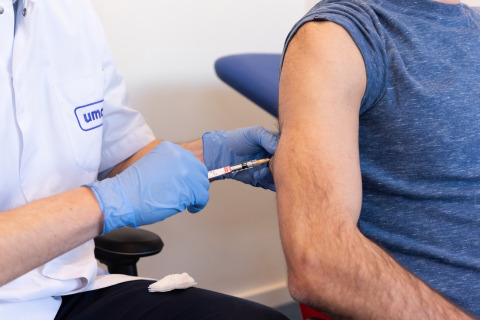- First subjects dosed with AKS-452, COVID-19 vaccine candidate in the Netherlands trial
- Vaccine is shelf-stable for 4 months at 25 degrees Celsius (77° Fahrenheit)
- 176 volunteers will participate in the clinical trial
- Safety and immune response read-outs expected in Q2 2021
Akston Biosciences Corporation, a developer of new classes of biologic therapeutics, announced today that the first participants have been dosed in an open-label trial of AKS-452, its COVID-19 vaccine candidate. The trial is managed by TRACER Europe B.V., a CRO specializing in fast-track clinical trials; and is being conducted at the University Medical Center Groningen (UMCG), one of the largest hospitals in the Netherlands. It will test both one- and two-dose regimens, each at three-dose levels.
This press release features multimedia. View the full release here: https://www.businesswire.com/news/home/20210412005522/en/

The first volunteer receives Akston Bioscience's COVID-19 vaccine candidate, AKS-452, as part of a Phase I/II clinical trial. The vaccine is shelf-stable for 4 months at temperatures up to 25°C (77°F). (Photo: Rachel van de Vliert)
“As a surgical oncologist, I treat patients every day who remain at great risk for COVID-19 infection,” said Schelto Kruijff, M.D. Ph.D., the trial’s principal investigator at the UMCG. “I am proud to be part of testing this highly innovative vaccine. From my volunteer work in Malawi and Kenya, I understand how important it would be to have a vaccine like this, which can be transported and stored for months without refrigeration.”
About the Phase I/II clinical trial
The Phase I/II clinical trial, an open-label study, will evaluate 176 healthy volunteers between the ages of 18 and 65. Participants will receive one dose or two doses 28 days apart and the protocol will assess three-dose levels (22.5, 45, and 90 micrograms) to determine safety, tolerability, and immune response.
About AKS-452
AKS-452 has demonstrated robust protection against infection in immunized non-human primates after challenge with the SARS-CoV-2 virus. Although intended to be refrigerated for long-term storage, it has been shown to be shelf-stable for at least 4 months at 25 degrees Celsius (77° Fahrenheit) and maintains its potency for 1 month at 37 degrees Celsius (95° Fahrenheit). The candidate does not include a live or weakened form of the virus, and has been engineered to use standard, low-cost, antibody manufacturing techniques, such that a single 2,000-liter production line could be capable of producing over one billion doses per year.
Based on Akston’s proprietary Fc fusion protein platform, AKS-452 is a CoV-2 subunit vaccine designed to induce or boost a Th1/Th2 mixed immune response in patients against the Receptor Binding Domain (RBD) of the novel coronavirus spike protein. The Fc moiety aids in delivering the vaccine to antigen-presenting cells via binding to the Fc-γ receptor, and subsequent antigen processing and presentation to CD4+ T-cells. Directing the immune system against the RBD instead of the entire spike protein may be the most efficient way to prevent viral attachment and infection with minimal side effects. Furthermore, being the primary locus for infection, the RBD is highly conserved among mutated forms of the virus, and preclinical studies of AKS-452 have demonstrated robust antibody neutralization of the B.1.1.7 and B.1.351 variants.
“This is an important milestone in meeting the worldwide need for a next-generation vaccine against the SARS-CoV2 virus, one that is stable for months at ambient temperatures and can be quickly manufactured at very large scale,” said Todd Zion, Ph.D., President & CEO of Akston Biosciences. “If proven safe and efficacious, AKS-452 promises to become an affordable and easily transportable vaccine that can speed the goal of achieving herd immunity, considering 93% of the world still has not been vaccinated. We believe that this is a vaccine for everywhere and everyone in the world.”
About Akston Biosciences
Akston Biosciences Corporation leverages its novel fusion protein platform to develop and manufacture new classes of biologics, including vaccines, ultra-long-acting insulins, and autoimmune disease therapies. Founded by the team that developed the world’s first clinical glucose-responsive insulin at SmartCells, Inc. (sold to Merck & Co.), Akston partnered with Dechra Pharmaceuticals PLC (DPH) to commercialize AKS-321d and AKS-425c, once-a-week canine and feline insulin therapies. It operates a GMP biologics manufacturing facility and research laboratory at its Beverly, Mass. location. www.akstonbio.com.
About TRACER
TRACER Europe B.V. (“TRACER”) is a Clinical Research Organization (CRO) specializing in fast-track solutions for testing innovative biologic medicines and is a founding member of the COVID-19 Rapid Cure Task Force (RCTF). TRACER and its partners provide its clients with the expertise, infrastructure, and capacity to rapidly generate accurate first-in-human clinical data.www.tracercro.com.
About University Medical Center Groningen
The University Medical Center Groningen (UMCG) is one of the largest hospitals in the Netherlands. The more than 12,000 employees work together on care, research, training and education with the common goal: building the future of health. Through innovative and sound research UMCG aims to understand mechanisms of disease; to push borders for diagnostics and treatment; and to help build a network for sustainable health. All of its research focuses on Healthy Ageing. Talent development and state-of-the-art infrastructure are of paramount importance to UMCG.
View source version on businesswire.com: https://www.businesswire.com/news/home/20210412005522/en/
Contacts
Linda Pendergast-Savage
Birnbach Communications for Akston Biosciences
508-224-7905
lpendergastsavage@birnbachcom.com













